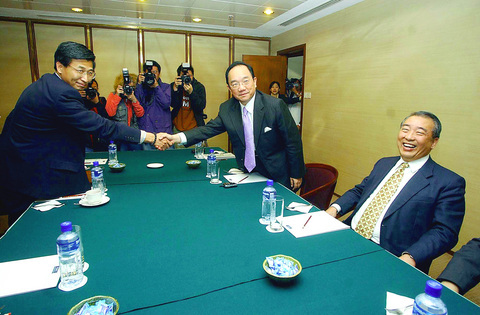Taiwan and China yesterday hammered out a landmark agreement on non-stop charter flights for the Lunar New Year holiday, a move hailed by some as the biggest breakthrough in cross-strait relations in years.
"The agreement will have a significant, positive impact upon cross-strait relations," Mainland Affairs Council Vice Chairman Chiu Tai-san (邱太三) said yesterday.

PHOTO:CNA
The agreement ushers in the first "direct" cross-strait flights since air links were terminated after the Civil War ended in 1949. The successful talks may serve as a departure point toward thawed relations between Taiwan and China, the council said.
"This round of talks sets a good example for cross-strait negotiations. Now both Taiwan and China are weighing the possibility of a `Macau model' for further delegates to follow," Chiu said.
During the meeting in Macau, the negotiators decided that a total of 48 flights will take off from Jan. 29 to Feb. 20.
The flights will travel to and from Taipei and Kaohsiung and the Chinese cities of Bejing, Shanghai and Guangzhou.
Six Taiwanese airlines and six Chinese carriers will be authorized to take Taiwanese businesspeople home.
Both sides expressed satisfaction with the progress, and said they were confident they could settle remaining undecided technical affairs soon.
"There is no difficulty. We solved everything very quickly," Billy Chang (
"In a very short time, in a cordial atmosphere, we have come to an agreement," Pu Zhaozhou (
As the final agreement mapped out the available routes, domestic air carriers are now vying to get their share of the flights.
China Airlines Corp (
Meanwhile, all six carriers also expressed their interest in flights to and from Shanghai, which has a large population of Taiwanese businesspeople. EVA Airways Corp (
Smaller carriers also declared their preferences. Mandarin Airlines Corp (
In 2003, Taiwan and China instituted Lunar New Year flights from Shanghai to Taipei to take Taiwanese working in China home, with stops in Hong Kong or Macau.
There were no such flights last year.

CHAOS: Iranians took to the streets playing celebratory music after reports of Khamenei’s death on Saturday, while mourners also gathered in Tehran yesterday Iranian Supreme Leader Ayatollah Ali Khamenei was killed in a major attack on Iran launched by Israel and the US, throwing the future of the Islamic republic into doubt and raising the risk of regional instability. Iranian state television and the state-run IRNA news agency announced the 86-year-old’s death early yesterday. US President Donald Trump said it gave Iranians their “greatest chance” to “take back” their country. The announcements came after a joint US and Israeli aerial bombardment that targeted Iranian military and governmental sites. Trump said the “heavy and pinpoint bombing” would continue through the week or as long

TRUST: The KMT said it respected the US’ timing and considerations, and hoped it would continue to honor its commitments to helping Taiwan bolster its defenses and deterrence US President Donald Trump is delaying a multibillion-dollar arms sale to Taiwan to ensure his visit to Beijing is successful, a New York Times report said. The weapons sales package has stalled in the US Department of State, the report said, citing US officials it did not identify. The White House has told agencies not to push forward ahead of Trump’s meeting with Chinese President Xi Jinping (習近平), it said. The two last month held a phone call to discuss trade and geopolitical flashpoints ahead of the summit. Xi raised the Taiwan issue and urged the US to handle arms sales to

State-run CPC Corp, Taiwan (CPC, 台灣中油) yesterday said that it had confirmed on Saturday night with its liquefied natural gas (LNG) and crude oil suppliers that shipments are proceeding as scheduled and that domestic supplies remain unaffected. The CPC yesterday announced the gasoline and diesel prices will rise by NT$0.2 and NT$0.4 per liter, respectively, starting Monday, citing Middle East tensions and blizzards in the eastern United States. CPC also iterated it has been reducing the proportion of crude oil imports from the Middle East and diversifying its supply sources in the past few years in response to geopolitical risks, expanding

Pro-democracy media tycoon Jimmy Lai’s (黎智英) fraud conviction and prison sentence were yesterday overturned by a Hong Kong court, in a surprise legal decision that comes soon after Lai was jailed for 20 years on a separate national security charge. Judges Jeremy Poon (潘兆初), Anthea Pang (彭寶琴) and Derek Pang (彭偉昌) said in the judgement that they allowed the appeal from Lai, and another defendant in the case, to proceed, as a lower court judge had “erred.” “The Court of Appeal gave them leave to appeal against their conviction, allowed their appeals, quashed the convictions and set aside the sentences,” the judges